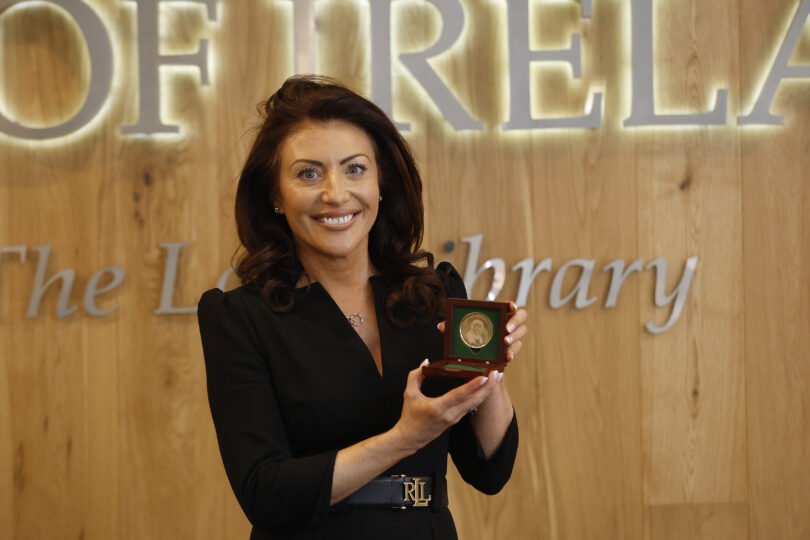Maria Watson BL | The 2025 Bar of Ireland Liberator Scholar
The Bar of Ireland has announced Maria Watson BL as the recipient of its Liberator Scholarship, an award established to mark the 250th anniversary of the birth of Daniel O’Connell, one of Ireland’s most important legal and political figures. Read her winning essay below.
Introduction
Daniel O’Connell (1775–1847), known as “The Liberator,” occupies a singular place in the annals of Irish and European political history. His leadership in the struggle for Catholic emancipation and his unwavering commitment to peaceful, constitutional methods of reform not only transformed nineteenth-century Ireland but also established enduring principles for civil rights activism worldwide. As contemporary societies grapple with persistent inequalities, rising authoritarianism, and the complexities of pluralism, O’Connell’s life and legacy offer a rich repository of lessons. His virtues—courage, conviction, and compassion—are not merely historical artefacts but living standards by which individuals and societies may measure their pursuit of justice and equity. This essay analyses the contemporary relevance of O’Connell’s achievements, focusing on the timeless virtues he embodied and the guidance his legacy provides for those striving to build a more just and equitable world.

O’Connell’s Courage: Defying Injustice through Peaceful Means
At the heart of O’Connell’s legacy lies a profound moral courage. In an era when Irish Catholics were systematically excluded from political and civil life, O’Connell dared to challenge the status quo through the force of reason and the mobilisation of mass support. His leadership in the campaign for Catholic emancipation, culminating in the passage of the Roman Catholic Relief Act 1829, was a testament to his willingness to confront entrenched power structures. O’Connell’s courage was not of the reckless or violent variety; rather, it was rooted in a principled rejection of violence as a means of achieving social and political change. He insisted on “moral force” over “physical force,” believing that lasting reform could only be secured through persuasion, legal argument, and the mobilisation of public opinion.
This approach was both radical and prescient. In an age marked by revolutionary upheaval across Europe, O’Connell’s steadfast commitment to non-violence set him apart from many of his contemporaries. His courage was not only in facing external opposition but also in resisting the temptation to resort to violence, even when such a path might have seemed expedient. The contemporary relevance of this lesson is striking. In a world where political polarisation and the threat of violence are ever-present, O’Connell’s example underscores the enduring efficacy and ethical imperative of peaceful protest. His legacy challenges activists and leaders alike to eschew violence, to seek dialogue, and to build broad-based coalitions for change.
Conviction and the Power of Organised, Peaceful Activism
O’Connell’s life was marked by an unwavering conviction in the principles of justice, equality, and self-determination. His strategic use of constitutional means and his ability to harness the collective voice of the disenfranchised redefined the relationship between the governed and the governing. Through the Catholic Association, O’Connell mobilised mass support, demonstrating the transformative potential of organised, peaceful activism. His election to Parliament in 1828, despite being legally barred from taking his seat, forced the British government to confront the untenable nature of Catholic exclusion and ultimately to concede emancipation.
The significance of O’Connell’s campaign lies not only in its immediate legislative success but also in its demonstration of the power of collective action. By harnessing the collective voice of the marginalised, O’Connell laid the groundwork for subsequent movements for suffrage and minority rights. His later campaign for the repeal of the Act of Union, though ultimately unsuccessful, further exemplified his commitment to constitutional methods and the principle of national self-determination. O’Connell’s vision of an Ireland governed by and for its people, free from external domination, continues to inspire debates on sovereignty, identity, and democratic participation.
For contemporary societies, the lesson is clear: meaningful and enduring change is possible when individuals and groups organise peacefully, articulate their demands with clarity and conviction, and persist in the face of adversity. O’Connell’s example serves as a blueprint for effective and principled leadership, reminding us that the struggle for justice requires not only passion but also discipline, strategy, and an unwavering commitment to constitutional principles.
Compassion and Inclusive Leadership: A Universalist Vision of Rights
Perhaps the most enduring aspect of O’Connell’s legacy is his compassion and commitment to inclusive leadership. While his primary focus was on Catholic emancipation, O’Connell consistently advocated for the rights of all oppressed groups, including Jews and enslaved people in the British Empire. His opposition to slavery, at a time when it was still widely accepted, reflected a universalist conception of human rights that transcended national and religious boundaries. O’Connell sought to unite disparate elements of Irish society—Catholics, Protestants, and Dissenters—under the banner of civil rights and national self-determination.
This inclusive approach was not merely rhetorical; it was grounded in a genuine belief in the dignity and worth of every individual. O’Connell’s personal integrity and ethical conduct set a standard for political leadership that remains relevant today. He was renowned for his honesty, his refusal to compromise on matters of principle, and his willingness to hold himself accountable to the public. In an era when political cynicism and corruption are pervasive, O’Connell’s example serves as a reminder of the importance of moral leadership. His life demonstrates that effective and enduring change is possible only when leaders are guided by a clear ethical compass and a genuine commitment to the common good.
For individuals and societies striving to create a more just and equitable world, O’Connell’s compassion and inclusivity offer a powerful model. His legacy challenges us to look beyond narrow self-interest, to embrace the rights and dignity of all people, and to build coalitions that transcend divisions of creed, class, and background.
Guidance for the Future: Enduring Lessons from O’Connell’s Legacy
The life and legacy of Daniel O’Connell offer a rich source of inspiration and guidance for contemporary and future social and political movements. His achievements in securing Catholic emancipation and advancing the cause of Irish self-government illustrate the transformative potential of organised, peaceful activism. His unwavering commitment to non-violence, inclusivity, and moral integrity provides a blueprint for effective and principled leadership in the face of injustice.
In a world grappling with persistent inequalities, rising authoritarianism, and the challenges of pluralism, O’Connell’s example is more relevant than ever. His insistence on constitutional methods, his ability to mobilise mass support without recourse to violence, and his dedication to the rights of all people, regardless of creed or background, offer enduring lessons for those seeking to build more just and inclusive societies. As we reflect on his legacy, we are reminded that the struggle for civil rights and social justice is ongoing, and that the principles embodied by O’Connell—courage, conviction, and compassion—remain essential to its success.
Conclusion
Daniel O’Connell’s life and legacy transcend the boundaries of time and place, offering invaluable lessons for individuals and societies committed to justice and equity. His courage in confronting injustice through peaceful means, his conviction in the power of organised activism, and his compassion for all oppressed peoples provide a moral and strategic framework for contemporary and future struggles. In an age marked by division and uncertainty, O’Connell’s example challenges us to lead with integrity, to act with courage, and to build a world in which the rights and dignity of every individual are respected. The enduring relevance of his legacy lies in its capacity to inspire and guide those who seek to create a more just and equitable world, now and in the future.
The 2025 Bar of Ireland Liberator Scholar
The views expressed above are the author’s own and do not necessarily reflect the views of The Bar of Ireland.
